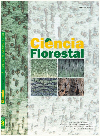
|
Ciência Florestal
Centro de Pesquisas Florestais - CEPEF, Departamento de Ciências Florestais - DCFL, Programa de Pós Graduação em Engenharia Florestal - PPGEF
ISSN: 0103-9954
EISSN: 0103-9954
Vol. 28, No. 1, 2018, pp. 274-282
|
 Bioline Code: cf18024
Bioline Code: cf18024
Full paper language: English
Document type: Research Article
Document available free of charge
|
|
|
Ciência Florestal, Vol. 28, No. 1, 2018, pp. 274-282
| pt |
EFEITO DA TERMORRETIFICAÇÃO NA QUALIDADE DE COLAGEM DE LÂMINAS DE MADEIRA PARA A PRODUÇÃO DE COMPENSADO
Ferreira, Bruno Santos; Campos, Cristiane Inácio de & Rangel, Elidiane Cipriano
Resumo
O compensado é um painel de madeira que pode ser utilizado tanto na indústria moveleira quanto na construção
civil, devido ao seu uso estrutural. Entretanto, para ser utilizado na construção civil, o compensado
necessita ser resistente aos agentes xilófagos e à umidade, sem comprometer suas propriedades mecânicas.
Nesse aspecto, a termorretificação surge como uma alternativa de tratamento, que aumenta a resistência da
madeira ao ataque de fungos e a sua estabilidade dimensional. Desse modo, o objetivo deste trabalho foi
avaliar o efeito da termorretificação na qualidade de colagem de lâminas de madeira para a produção de
compensado. Para isso, foram realizados os testes de molhabilidade utilizando o goniômetro digital, para
lâminas tratadas nas três temperaturas e na amostra de controle. Além disso, foi realizado, o ensaio de cisalhamento
na linha de cola, para testar a qualidade da colagem segundo a ABNT NBR ISO 12466-1 (2006).
Com os resultados obtidos pode-se perceber que a superfície da madeira tratada se tornou mais hidrofóbica
com o aumento da temperatura, e isso resultou também na diminuição da resistência ao cisalhamento na
linha de cola, pois o adesivo utilizado (fenol-formaldeído) é à base de água, contudo, os requisitos normativos
foram atendidos.
Palavras-chave
temperatura; molhabilidade; Pinus taeda; cisalhamento na linha de cola.
|
| |
| en |
EFFECT OF HEAT TREATMENT ON THE BONDING QUALITY OF WOOD VENEERS TO PLYWOOD PRODUCTION
Ferreira, Bruno Santos; Campos, Cristiane Inácio de & Rangel, Elidiane Cipriano
Abstract
Plywood is a wood panel that can be used both in the furniture industry and in construction due to its
structural use. However, to be used in construction, it needs to be resistant against wood decay agents
and water, without compromising its mechanical properties. The heat treatment is an alternative treatment
which improves the wood resistance to fungi and improves its dimensional stability. Thus, the objective of
this study is to evaluate the influence of the heat treatment with three different temperatures, 160, 180 and
200°C in the wettability of wood veneers and the shear strength in the bond line of the plywood produced
with them. To do so, it was carried out the wettability testing using digital goniometer in the treated veneers
at three temperatures and for the control specimen. Besides, it was carried out the shear strength in the
bond line test, for testing the quality of bonding according to ABNT NBR ISO 12466-1 (2006). Because
of the results obtained, it could be seen that the surface of the treated wood became more hydrophobic
with increasing temperature, and this also resulted in a decrease in shear strength in the bond line, once the
adhesive used (phenol-formaldehyde) is water based, however, the regulatory requirements have been met.
Keywords
temperature; wettability; Pinus taeda; shear strenght in the bondline.
|
| |
© Copyright 2018 - Ciência Florestal
Alternative site location: http://cascavel.ufsm.br/revistas/ojs-2.2.2/index.php/cienciaflorestal/index
|
|
